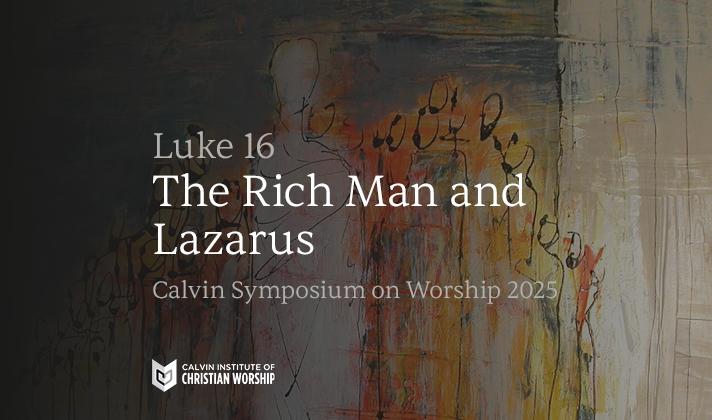John Witvliet [00:00:07] Thank you. And speaking of anxiety, the petition ‚ÄúGive us this day our daily bread‚ÄĚ is really a pretty powerful way of responding to the anxiety that many people in this world feel and that all of us need to learn new dispositions about. So say a little bit about that petition: ‚ÄúGive us this day our daily bread.‚ÄĚ
Mark Charles [00:00:32] I remember hearing a teacher teach one time on prayer, and they said we spend a lot of time praying for things that God has already promised. We ask God to be with us. And yet we're promised over and over by Creator in Scripture, and even through the experience of creation, that God will never leave us. He's always there. We need to pray for God to be with us, right? We need to pray that we will know where God is or feel that God is near us. That's the concern we need to be much more focused on. And again, praying for your daily bread: When you have a regular paycheck and a refrigerator full of food and a pantry full of canned goods, praying for your daily bread can lead to a disconnect, I think, of what that prayer is actually about. And so oftentimes what I will pray in place of ‚ÄúProvide daily bread,‚ÄĚ at least for myself individually, I will pray and ask God to give me a glad and generous heart that day. ‚ÄúGod, I have more than enough to eat today. May I be generous with the people I meet. May I have a generous and giving heart with the people I interact with. May I be able to share the abundance that you've given me.‚ÄĚ Because if we just pray ‚ÄúGive us today our daily bread,‚ÄĚ what we begin to do is we begin to not be content with what is simplistic. I mean, Jesus would pray this; even when he provided food for 5000 people, it was bread and fish. It wasn't like this massive gourmet meal, you know? And here we're eating steak and chicken and vegan stuff and all that. So when you begin to pray that way, it begins to become more about what you want than about what you need. And when you pray that prayer and you already have everything you need, then it just becomes ‚ÄúI want this and I want this, God.‚ÄĚ And so I actually try to be disciplined about . . . I need to remember what God already provided for me. And so I have more than enough bread to eat today. The biggest concern is not what am I going to eat at noon or at five. The biggest concern I need to be most concerned about is, am I going to be generous with people I interact with today. Because there's a lot of people who don't have enough to eat, whether it's in my immediate context or around the globe. And so I do pray, as Jesus does here, on a global scale: ‚ÄúGive us today our daily bread.‚ÄĚ He's very communal in his language. But I also try to acknowledge that if I pray that individually it can lead to a spirit of discontent because you begin praying for what you want instead of what you need. And so I try to use this part of the prayer to focus more on my own heart and am I going to be generous today. And then when I do need things, whether it's‚ÄĒbeyond bread, I have a task I'm doing that day; I have a project, and there's needs for that‚ÄĒI will [pray], ‚ÄúFather, give me what I need to accomplish this.‚ÄĚ But I try to be less specific.
I've talked about this in other teachings I've given: God is Creator. And so often we treat God like a banker. And we ask God for money and for all these things‚ÄĒ‚ÄĚGod, I need these finances to accomplish this thing‚ÄĚ instead of ‚ÄúGod, you're Creator.‚ÄĚ Understanding the difference between God as Creator, which is who God is, and God as a banker, which is who our society largely says God is . . . It's so easy to pray, especially in this section of the prayer where we're talking about daily needs, to simply treat God as a banker instead of treating God as a Creator. If God is a banker, when Moses is at the Red Sea, what would he pray? He would pray for the resources to build a bridge, right? Instead, he's there with Creator, and Creator does things differently. He parts the sea, right? I mean, that's just two completely different ways of thinking. And I think how we pray this prayer can help define who do we see God as. Do we see God as a banker? Or do we see God as a Creator? Do we allow space for God to answer our prayers as a Creator, or do we pray so specifically and so even demandingly that the only way we can see God do something is if God interacts with us as a banker? And that's the dangerous part of this section of the prayer, is we pray for things we want instead of what we actually need, and then we end up being disappointed or even selfish with what we have. Or we use this part of the prayer to interact with God as a banker instead of interacting with God as Creator.





